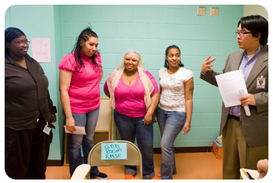 Publishing goal histories with incarcerated students leaves indelible mark on all involved “We are working against three simultaneous hourglasses: students’ release from incarceration, students’ education, and the psychological time it takes for the students to understand their life history and where they want to go. In this specific way, we are seeking to improve the lives of students, the schools they attend, and society through publication of unheard voices. I feel so fortunate to be a part of this program; it has been such an affirmation for me.” -Jondou Chen, Project Coordinator, Rikers Island Oral Histories Project By the end of his first year at Teachers College, Columbia University (TC) Jondou Chen found himself wrestling with the provider/researcher divide. “I enjoyed learning about and practicing large-scale, quantitative social science research,” he remembered. “Yet I found myself also missing the day-to-day encounters with the individuals whose agency I sought to support.” When his advisor, Dr. Jeanne Brooks-Gunn, suggested he apply for a Zankel Fellowship to work with the Rikers Island Oral Histories Project, Chen didn’t realize how much it would change him as a person. Now, three years later, as Project Coordinator of the Student Press Initiative’s Rikers Island program, Chen isn’t looking back. “I am humbled every day I spend with the project… not only in personally witnessing the cumulative costs of social disadvantage, but also in partnering with the educators and incarcerated students of Rikers Island who are actively seeking redress,” he said.
Chen is one of a core group of graduate students from TC, led by SPI Founding Director Erick Gordon, who work with students and faculty at Horizon Academy, the Department of Education’s high school at Rikers Island. From its start, the program took hold and expanded at incredible rates for both Horizon Academy and TC. Beginning five years ago as a single classroom project with men at the Otis Bantum Correctional Center, the project now works with students at both Horizon and Island Academies. This project helps incarcerated students articulate the stories of their lives, first orally and then in writing, all while building critical literacy skills in addition to self-confidence and a sense of accomplishment. The SPI team averages two to three trips a week, visiting each of the three sites at least twenty-five times throughout the year. Horizon Academy Students produced ten distinct and gripping volumes-stories of spirit, struggle, and heart including Still Waiting: Stories, Struggles, and Strengthfrom the RMSC [Rose M. Singer Center], the first publication of oral histories by incarcerated women at Rikers Island. The impact of the program touches all involved: the school, students, and the TC team. Chen said, “The power of this work is its realness, its tangibility, its ability to transform all who are involved. It makes you realize how diverse the world is, how deep and multifaceted its problems are, and how resilient an individual can be.” Chen’s sentiments are echoed by a growing number of graduate students at TC each year, whether they are intern interviewers working directly with students, transcribers, readers and collaborating editors, research assistants, literacy specialists, or neighborhood photographers. Gordon said, “This is a fieldwork experience that forever changes your life. The exchange is profound-for all involved parties. |
|
The Center for Professional Education of Teachers (CPET) at Teachers College, Columbia University is committed to making excellent and equitable education accessible worldwide. CPET unites theory and practice to promote transformational change. We design innovative projects, cultivate sustainable partnerships, and conduct research through direct and online services to youth and educators. Grounded in adult learning theories, our six core principles structure our customized approach and expand the capacities of educators around the world.
|
ABOUT US
525 West 120th Street, Box 182 New York, NY 10027 416 Zankel Ph: (212) 678-3161 [email protected] Our Team Career Opportunities |
RESOURCES
Professional Articles Ready-to-Use Resources Teaching Today Podcast Upcoming PD Opportunities |
COACHING SERVICES
Custom Coaching Global Learning Alliance Literacy Unbound New Teacher Network Student Press Initiative |




















